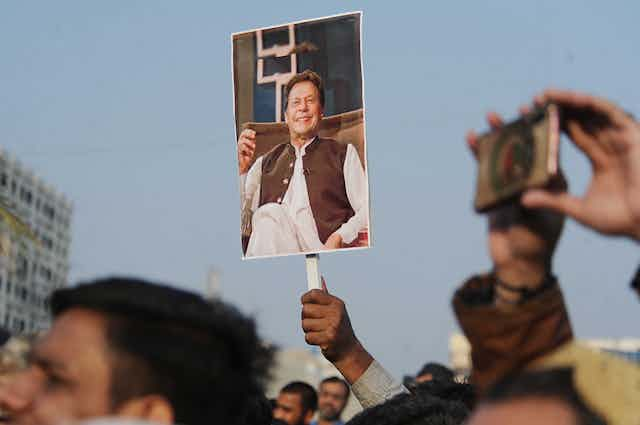Pakistan’s former prime minister, Imran Khan, has been sentenced to seven years in prison after a Pakistani court ruled his marriage un-Islamic and illegal. Khan had already been sentenced to 14 years in jail for corruption and barred from holding public office for ten years a week earlier and, a day before that, ten years in prison for leaking official state secrets.
Khan claims that the cases against him are politically motivated. Since being deposed in 2022, Khan has taken aim at the country’s powerful military, which has a long history of interfering in politics. He has accused the army chief, the military establishment and the US government of conspiring against him.
Now he argues that military leadership have orchestrated his imprisonment so he cannot run in the upcoming general election on February 8.
Members of Khan’s Pakistan Tehreek-e-Insaf (PTI) party have also been imprisoned or pressured into leaving their positions, and workers have been prevented from holding political rallies in the run up to the election.
The relentless harassment and intimidation of the PTI and its supporters, and the favour shown to Nawaz Sharif of the opposition Pakistan Muslim League (Nawaz) party, has led to a muted election campaign. Sharif has been prime minister three times, but was ousted in 2017.
Khan will appeal his convictions and is likely to get some relief from the courts. But one thing is clear: the military has no intention of allowing a free and fair election on February 8.

Military dominance
The military’s organisation, structures and practices were developed under the British (who ruled what is now Pakistan until independence in 1947). But its expansion into politics is rooted in the persistent fear of war with India, its desire to control foreign policy, and its wish to protect its budgetary allocations and fiscal interests.
In 2022, military expenditure accounted for nearly 18% of government spending in Pakistan, making the military the best-resourced institution in the country. It is also a business conglomerate and owns millions of acres of public land. And it has received considerable military assistance as a frontline ally of the US during its engagements in Afghanistan.
The military has long looked to prevent the election of anyone who might try to influence policies that diverge from its entrenched interests. In 2017, Sharif, who was then prime minister, fell out of favour with the military following disagreements about normalising relations with India. Sharif was arrested on charges of corruption and sentenced to ten years in jail less than two weeks before the 2018 general election.
Khan won that election with the backing of the military. But, despite starting his time in office by being on “one page” with the military and ceding alarming amounts of political space to them, Khan’s relationship with the military soon turned sour. Tensions exploded when Khan tried to retain Lieutenant-General Faiz Hameed as the military spy chief, rejecting the nominee of army chief General Qamar Bajwa.
In April 2022, Khan was ousted from power in a vote of no-confidence. He accused the US of engineering his removal and made numerous claims that challenged the military directly. He alleged that the then army chief held a grudge against him, that the military had arrested and tried to assassinate him, and that the military was “above the law”.
Khan’s accusations culminated in his arrest on corruption charges on May 9 2023. His imprisonment has resulted in an unprecedented public backlash against the military. Khan’s supporters attacked state institutions and military installations, even breaching the army’s headquarters.
Hundreds of PTI supporters were arrested and the military vowed to “punish” them, handing many over to military courts in violation of international law. Three military officials were sacked for their role in the unrest. Since then, the military has by all accounts tightened its grip over Pakistan’s politics, even publicly admitting to meddling in politics.

Overdue polls
Pakistan’s national elections were supposed to be held in November 2023. But they were delayed due to the need to redraw constituency boundaries following a census. Many are sceptical of this claim and have questioned the ability of Pakistan’s electoral commission to conduct fair polls.
The lead up to the delayed polls has been marred by violence. And, though the polls are expected to go ahead, the electoral commission has asked for security support from the military.
Meanwhile, the PTI has faced persistent harassment. Its website is blocked in Pakistan and the party has faced legal setbacks such as losing its electoral symbol – the cricket bat – for not holding intra-party elections. The continuing harassment and intimidation of PTI supporters may also have a chilling effect on voters.
No election in Pakistan can be called free and fair for as long as the military establishment continues to play kingmaker. The election on February 8 is no different.
The military’s political engineering has ensured that it is impossible for there to be a level playing field for the parties on election day. It only remains to be seen if citizens will turn out to exercise their right to vote.

